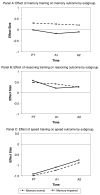Effect of memory impairment on training outcomes in ACTIVE
- PMID: 17942013
- PMCID: PMC2733239
- DOI: 10.1017/S1355617707071512
Effect of memory impairment on training outcomes in ACTIVE
Abstract
Cognitive training improves mental abilities in older adults, but the trainability of persons with memory impairment is unclear. We conducted a subgroup analysis of subjects in the Advanced Cognitive Training for Independent and Vital Elderly (ACTIVE) trial to examine this issue. ACTIVE enrolled 2802 non-demented, community-dwelling adults aged 65 years and older and randomly assigned them to one of four groups: Memory training, reasoning training, speed-of-processing training, or no-contact control. For this study, participants were defined as memory-impaired if baseline Rey Auditory Verbal Learning Test (AVLT) sum recall score was 1.5 SD or more below predicted AVLT sum recall score from a regression-derived formula using age, education, ethnicity, and vocabulary from all subjects at baseline. Assessments were taken at baseline (BL), post-test, first annual (A1), and second annual (A2) follow-up. One hundred and ninety-three subjects were defined as memory-impaired and 2580 were memory-normal. Training gain as a function memory status (impaired vs. normal) was compared in a mixed effects model. Results indicated that memory-impaired participants failed to benefit from Memory training but did show normal training gains after reasoning and speed training. Memory function appears to mediate response to structured cognitive interventions in older adults.
Figures


References
-
- Ball K, Berch DB, Helmers KF, Jobe JB, Leveck MD, Marsiske M, Morris JN, Rebok GW, Smith DM, Tennstedt SL, Unverzagt FW, Willis SL, Advanced Cognitive Training for Independent and Vital Elderly Study Group Effects of cognitive training interventions with older adults: A randomized controlled trial. Journal of the American Medical Association. 2002;288:2271–2281. - PMC - PubMed
-
- Ball KK, Beard BL, Roenker DL, Miller RL, Griggs DS. Age and Visual-Search—Expanding the Useful Field of View. Journal of the Optical Society of America A-Optics Image Science and Vision. 1988;5:2210–2219. - PubMed
-
- Baltes PB, Willis SL. Plasticity and enhancement of intellectual functioning in old age: Penn State's Adult Development and Enrichment Project (ADEPT) In: Craik F, Trehub S, editors. Aging and Cognitive Processes. Plenum Press; New York: 1982. pp. 353–390.
-
- Belleville S, Gilbert B, Fontaine F, Gagnon L, Menard E, Gauthier S. Improvement of episodic memory in persons with Mild Cognitive Impairment and healthy older adults: Evidence from a cognitive intervention program. Dementia and Geriatric Cognitive Disorders. 2006;22:486–499. - PubMed
-
- Blom G. Statistical Estimates and Transformed Beta Variables. John Wiley & Sons; New York: 1958.
Publication types
MeSH terms
Grants and funding
- R01 AG14289/AG/NIA NIH HHS/United States
- R01 NR04508/NR/NINR NIH HHS/United States
- R01 AG14282/AG/NIA NIH HHS/United States
- R01 AG014276/AG/NIA NIH HHS/United States
- U01 AG014282/AG/NIA NIH HHS/United States
- U01 AG014289/AG/NIA NIH HHS/United States
- R01 AG14260/AG/NIA NIH HHS/United States
- U01 NR004507/NR/NINR NIH HHS/United States
- U01 NR004508/NR/NINR NIH HHS/United States
- R01 NR04507/NR/NINR NIH HHS/United States
- R01 AG026096/AG/NIA NIH HHS/United States
- R01 AG14263/AG/NIA NIH HHS/United States
- U01 AG014260/AG/NIA NIH HHS/United States
- U01 AG014276/AG/NIA NIH HHS/United States
- U01 AG014263/AG/NIA NIH HHS/United States
LinkOut - more resources
Full Text Sources
Other Literature Sources
Medical

